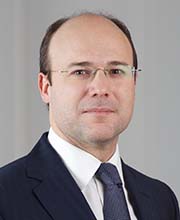The SFDR regulation and the administration of withholding tax have been challenges for third-party fund administrators over the past year. But in our poll of leading figures in the admin industry, we also hear there’s a better future for the ELTIF.
 HOPE FOR THE ELTIF
HOPE FOR THE ELTIF
Eoin FitzGerald, MD and office head, BBH Dublin
There had been much speculation about domicile shifts around Brexit, but so far little has changed. Ireland and Luxembourg appear to have copper-fastened their statuses as the leading cross-border fund centres. The recent addition of the Irish Limited Partnership (ILP) to Ireland’s toolkit for private market funds is a welcome addition, particularly with its common law framework and cultural alignment with US and UK alternative managers.
But in the immediate term, while we continue to see strong growth in our ETF servicing in Ireland, Luxembourg remains a vibrant hub for private market fund launches.
Another one to watch is the European Long Term Investment Fund (Eltif), which was unloved for a long time, but recently has found a growing niche with managers looking for a regulated vehicle to house illiquid assets with flexible redemption terms for distribution to private banks, high-net-worth and DC pension investors. Recent launches in Luxembourg, France and Spain show that Eltif, neglected for so long, may now be finding a more receptive audience. With ongoing enhancements to the regime already under way, Eltif is on the lips of many asset managers soon.
 CONSIDERABLE PACE OF REGULATORY CHANGE
CONSIDERABLE PACE OF REGULATORY CHANGE
Arnaud Claudon, head of asset owners and asset managers, BNP Paribas Securities Services
The pace of regulatory change across our major markets (EMEA, APAC, the Americas) is considerable, and we expect this to continue in the near future. This challenge is a cornerstone of our business strategy and we endeavour to turn this into an opportunity, as we help many of the world’s prominent asset managers in addressing their regulatory requirements and supporting their institutional client base, whatever their strategies.
As a global provider that services all traditional and alternative asset classes, we assess the regulatory demands on a huge variety of fund types, domiciles and asset classes.
As a result, we are constantly reviewing and evolving our suite of services. One example is the EU’s Sustainable Finance Disclosure Regulation (SFDR), where the lead time between finalisation of guidelines and implementation is very short. We have coordinated closely with market participants across our network and the wider ecosystem, including software vendors, data providers, and professional associations, to help us understand how to address the new ESG [environmental, social and governance] requirements and incorporate these into our strategy and business models.
Most importantly, we work closely with our clients and preferred partners in order to test and design efficient solutions that can add value.
 A JUDDERING HALT
A JUDDERING HALT
Mariano Giralt, global head of tax and regulatory, BNY Mellon
A significant administrative challenge over the last year relates to withholding tax. At the best of times, the process of obtaining tax relief on overseas investments is a cumbersome, costly and time-consuming administrative process.
Covid-19 brought it to a juddering halt. The problem primarily arose from the challenge of moving the paper documentation – including physical documents with wet ink signatures – needed to obtain tax relief. This, combined with the slowdown or cessation of production of required documents (such as certificates of residence) and information due to changed working arrangements in government offices and other organisations, led to an inevitable backlog of claims.
One of the clearest learnings from the crisis is the value of digitalisation and automation processes to keep the show on the road. Seamless transmission of data via solutions that are interoperable, standardised, global and available to all parties would have enabled this important – but often overlooked – part of the financial system to keep functioning at near-to-normal levels.
The good news is that the past year’s challenges has increased the focus on digitisation and harmonisation in the withholding tax processing in portfolio investments, and we expect this will bring more automation, consistency and certainty going forward.
 SUITED TO A LOCATION
SUITED TO A LOCATION
Marcel Guibout, Executive director, Emea fund services, JP Morgan
We continue to see new fund launches in all the main domiciles across the region, typically driven by location suitability to the fund type and distribution strategy. As fund managers have been focused on the implications of Brexit, we have seen a number of established Ucits managers initiate or increase product range in the UK market.
A consistent regulatory theme we are seeing across the region is the focus and scrutiny on clients’ substance in location and oversight of delegated activities, including to third-party administrators. We have been working closely with our clients to help them ensure an optimum oversight framework is in place, with the right level of transparency over activities.
Our investment focus on client-facing technology such as our NAV Analytics and Transfer Agency Portal platforms has enabled clients to integrate data and information efficiently within their operating framework as key components in undertaking their regulatory responsibilities.
 DOMICILE-AGNOSTIC
DOMICILE-AGNOSTIC
Clive Bellows, head of global fund services, Emea, Northern Trust
Our experience of working with clients towards the end of 2020 and start of this year was that there were few surprises around the formal departure of the UK from the EU – asset managers were well advanced in their planning and experienced comparatively little disruption as a result. However, it remains to be seen what the longer-term impacts will be for fund administration, and any shifts in activity will likely become more apparent over an extended period of time.
Asset management across Europe is an increasingly cross-border business, however. So, at Northern Trust we think it’s only going to become more important as a provider of fund administration services to be domicile-agnostic – with the operating model, technology and capability to provide a consistent experience for clients and investors regardless of where they are based – whether that is, for example, in Dublin, London or Luxembourg.
 ATTRACTIVE LEGAL FORM
ATTRACTIVE LEGAL FORM
Jean-Pierre Gomez, head of regulatory & public affairs, Luxembourg, Societe Generale Securities Services
Most of the time, Luxembourg is the selected domicile for moving or setting a fund from a European country to another.
Probably, the main reason is that Luxembourg remains the first fund domicile in the EU with more than €5,000 billion of assets. It represents nearly 30% of market share in Europe and 40% of Ucits structures. It is easier to market a Ucits fund to another EU country if the fund is based in Luxembourg.
Luxembourg is the only country in Europe where you can file your fund registration and documents with the local authority in French, German and English.
Regarding cross-border distribution, 58% of agreements for worldwide distribution are allocated to Luxembourg funds.
Another advantage of Luxembourg is the popular fund structure RAIF, launched in 2016. It allows the possibility to create an AIF – alternative investment fund – without requiring the CSSF approval. This regulated fund is not supervised by the CSSF.
Another example of an attractive legal form in Luxembourg is the SCSp. It was introduced in 2013 at the time of the implementation of the AIFMD. Its operation is similar to that of a limited partnership and serves as an additional investment vehicle suitable for investment funds.
An SCSp is a commercial company whose main difference with the SCS is that the SCSp does not have a legal personality.
 A DAUNTING REGULATION
A DAUNTING REGULATION
Katja Müller, chief customer officer, Universal-Investment
One of this year’s regulatory challenges – apart from AIFMD II – for fund initiators as well as institutional investors is the Sustainable Finance Disclosure Regulation (SFDR). Complying with some of its key aspects can be daunting, for instance because data from multiple sources and vendors must be integrated. Additionally, SFDR requires our clients to work with a lot of non-financial data such as carbon emissions.
As a fund service platform and partner to our clients, we are in the position to link the entire value chain of asset management and to support our clients in sustainable investments as a competent partner. Integrating this data in our award-recognised ESG reporting is thus a priority for us.
Through the establishment of an ESG hub for knowledge-sharing, we also support them in integrating sustainability in their investments and accompany them with our expertise. Further innovations such as a pilot project for ESG sentiment analyses provide them with data to make better investment decisions in the future.
© 2021 funds europe





